|
|
|
Sort Order |
|
|
|
Items / Page
|
|
|
|
|
|
|
| Srl | Item |
| 1 |
ID:
081755
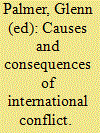

|
|
|
|
|
| Publication |
London, Routledge, 2008.
|
| Description |
xvi, 251p.
|
| Series |
Contemporary security studies
|
| Standard Number |
9780415433907
|
|
|
|
|
|
|
|
|
|
|
|
Copies: C:1/I:0,R:0,Q:0
Circulation
| Accession# | Call# | Current Location | Status | Policy | Location |
| 053437 | 355.027/PAL 053437 | Main | On Shelf | General | |
|
|
|
|
| 2 |
ID:
145782
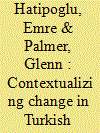

|
|
|
|
|
| Summary/Abstract |
The level of activism in Turkey's foreign policy has reached unprecedented levels during the country's modern history. This increased activism contrasts starkly with Turkey's characteristically traditional status quo orientation evinced during the Cold War. This study aims to establish a theoretical foundation to explain this multifaceted change in Turkish foreign policy. In doing so, it contends that the ‘two-good’ theory of foreign policy renders considerable analytical leverage for contextualizing recent changes in Turkish foreign policy. The theory posits that change in a country's foreign policy is contingent upon its willingness and capability to actively promote its interests. Furthermore, the ‘two-good’ theory postulates the method a country might employ to implement its foreign policy is a function of these two factors as well. The theory leads to two testable hypotheses regarding Turkish foreign policy. This study supports these hypotheses with qualitative and quantitative evidence.
|
|
|
|
|
|
|
|
|
|
|
|
|
|
|
|
| 3 |
ID:
114675


|
|
|
|
|
| Publication |
2012.
|
| Summary/Abstract |
Two significant changes in the research on international conflict have occurred in the last couple of decades. First, the realist perspective has been challenged by a large body of research that investigates the impacts of domestic institutions and other liberal factors on international conflict. Second, the emphasis on international conflict has moved from a focus on war to lower levels of conflict such as threats, displays, or uses of force by one nation-state against another. This article will review the effect these recent developments have had on the study of democratic peace theory, trade and conflict, and cultural theories of war.
|
|
|
|
|
|
|
|
|
|
|
|
|
|
|
|
| 4 |
ID:
138306


|
|
|
|
|
| Summary/Abstract |
How and why do regime type and interstate war affect government spending? We argue that a political leader allocates scarce resources between social and military expenditures as a function of their relative efficiency in securing her political survival. We derive four hypotheses concerning how mobilization for and demobilization from interstate war affects government spending differently in democratic and autocratic regimes. Compared to democracies, autocracies should increase military spending to a greater degree during wartime and decrease military spending to a greater extent following a war. Autocracies also should cut social spending more during an interstate war and increase social spending more during the process of demobilization from war than democracies. Our analyses of all states in the international system from 1950 to 2001 yield support for our hypotheses.
|
|
|
|
|
|
|
|
|
|
|
|
|
|
|
|
| 5 |
ID:
072143
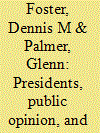

|
|
|
|
|
| Publication |
2006.
|
| Summary/Abstract |
Numerous works have studied the relationship between public approval and the propensity of United States presidents to use force abroad. One of these (Morgan and Bickers 1992 ) relies upon a refined view of internalization-externalization processes to reformulate the diversionary theory of conflict. The authors postulate that, as presidents are concerned with maintaining popularity among individuals upon whose support their continued power rests, they are more inclined to use diversionary force when approval among members of their party declines. Using more extensive and comprehensive measures of militarized actions, we find no support for Morgan and Bickers' original hypothesis, indicating that the results of one of the very few works that finds any evidence of diversion from low public approval may not be valid. In fact, event count analyses reveal that precisely the opposite relationship is operative. Additionally, Morgan and Bickers' formulation fails to account for potential differences in conflict propensity stemming from differences in political parties. We hypothesize that presidents whose partisan supporters are expected to react favorably to "hawkish" actions (Republicans) are more likely to use force abroad when faced with declining partisan support than those leaders whose partisan supporters are generally "dovish" (Democrats). Our results yield little support for this hypothesis. We conclude the article by exploring some possible explanations for our findings.
|
|
|
|
|
|
|
|
|
|
|
|
|
|
|
|
| 6 |
ID:
148160
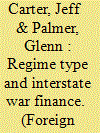

|
|
|
|
|
| Summary/Abstract |
Governments can finance the higher military spending associated with interstate war through a combination of cutting nonmilitary spending, imposing higher taxes, borrowing, and adopting an inflationary monetary policy. We argue that the incentives of survival-motivated leaders influence the strategies governments use to fund their war efforts and that regime type conditions the use of some finance strategies. Consistent with our expectations, we find that fighting an interstate war is associated with greater reductions in nonmilitary spending in dictatorships than in democracies and that contemporary democracies and dictatorships have largely avoided financing their wars through tax increases and inflation. We find little support for the argument that democracies finance their interstate wars through greater debt than nondemocracies.
|
|
|
|
|
|
|
|
|
|
|
|
|
|
|
|
| 7 |
ID:
113754
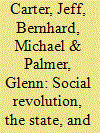

|
|
|
|
|
| Publication |
2012.
|
| Summary/Abstract |
Democracy has been the primary focus of our efforts to understand the impact of domestic institutions on processes of international conflict. In this article, we examine how a particular nondemocratic regime type, postrevolutionary states, affects military capabilities and war outcomes. Drawing on scholarship that conceptualizes revolutions as a unique class of modernizing events that result in stronger state structures, we argue that postrevolutionary states should be better able to mobilize populations and economic resources for military purposes. Tests performed on a comprehensive sample of twentieth-century states and interstate wars confirm our predictions: postrevolutionary states have larger, better funded militaries and achieve more successful war outcomes.
|
|
|
|
|
|
|
|
|
|
|
|
|
|
|
|
| 8 |
ID:
098252
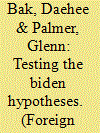

|
|
|
|
|
| Publication |
2010.
|
| Summary/Abstract |
Senator Joseph R. Biden Jr. predicted that Barack Obama would face an international challenge in his early term by foreign enemies who want to test a young leader's resolve as a chief executive just like John F. Kennedy did in the Cuban missile crisis in 1962. We test this argument using the directed-leader-dyad-period data for both world leaders and the US presidents between 1875 and 2001. We find that old leaders are more likely to be a target of militarized disputes, and even more so during the early term as opposed to Biden's prediction. The impact of tenure on the likelihood of being targeted largely depends on age. We also find that old Republican US presidents are especially vulnerable to foreign challenges early in their term.
|
|
|
|
|
|
|
|
|
|
|
|
|
|
|
|
| 9 |
ID:
073909
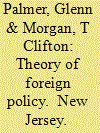

|
|
|
|
|
| Publication |
New Jersey, Princeton University Press, 2006.
|
| Description |
xvi, 215p.
|
| Standard Number |
0691123594
|
|
|
|
|
|
|
|
|
|
|
|
Copies: C:1/I:0,R:0,Q:0
Circulation
| Accession# | Call# | Current Location | Status | Policy | Location |
| 051659 | 327.101/PAL 051659 | Main | On Shelf | General | |
|
|
|
|
|
|
|
|
|